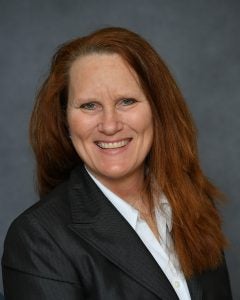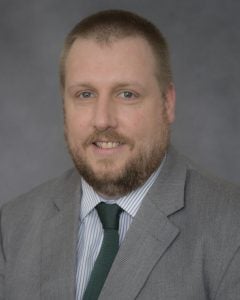The Master of Science degree in Biomechanics was established in Fall 2016, and remains the only true biomechanics graduate degree in the state of West Virginia. The program offers two tracks, a Comprehensive track and a Sports Science Area of Emphasis.
- Program Mission
- Program Requirements
- Admission and Performance Standards
- Course Descriptions
- Learning Outcomes
- Employment Opportunities
- Sports Science Area of Emphasis
The mission of the our M.S. program in Biomechanics (MSBiomech) is to prepare students for advanced studies in human movement science, medical career paths such as physical therapy and medicine, and employment in areas of exercise science (research associates, laboratory technicians, academia).
Skills and Career Paths in Biomechanics
The MSBiomech prepares students to enter a variety of career paths. The biomechanics field is diverse; therefore job descriptions are just as diverse. Often jobs are in research and development with specialization in orthopedics or movement analysis. Specialization in orthopedics involves working with orthopedic surgeons in research and development of surgical procedures, instrumentation and equipment, while movement analysis is related to investigation of injuries (cause and prevention) or performance. Movement analysis utilizes instrumentation including high speed cameras, force measurement, electromyography and computer software to analyze human movement. This is often related to technique analysis and/or the design and development of equipment. Additionally, gait analysis (e.g., walking, running) is a common area of interest for biomechanics, although all aspects of human movement are investigated. Biomechanists work with physicians, physical therapists, athletic trainers, coaches, and athletes to determine the efficiency of movement to prevent injuries and improve performance. Affiliations with healthcare providers and access to the latest technology in research equipment and software make Marshall University a perfect environment for this major.
Choosing a Pathway: Comprehensive or Sports Science Area of Emphasis?
The comprehensive Master of Science in Biomechanics is a highly technical degree with a strong emphasis on instrumentation and research. The Sports Science Area of Emphasis (AoE) was designed to replace some of the highly technical coursework in that program with interdisciplinary kinesiology courses that will prepare students for in-the-field human movement assessment with individuals and teams, rather than careers based primarily in a highly technical settings.
Students who choose the Comprehensive Biomechanics route are interested in research and typically come from areas such as Athletic Training, Physical Therapy, or Exercise Science. They complete courses on topics such as Human Biomechanics, Biomechanical Instrumentation, Human Locomotion, Kinesiology, Electromyography, Exercise Physiology, and Research and Statistics, with a focus on completion of a thesis project. The program’s research focus is on the application of biomechanics to the solution of problems. Thus, the student’s research is often an investigation of a problem that they may have encountered through their own professional and clinical experience, during or prior to their time in the program.
The focus in the Sports Science AoE is hands-on practicums leading to a final internship. These practicums guide students through the hands-on use of exercise testing technology to deliver outcomes to teams and individuals, with the student’s independence increasing as they progress through the program. The internship will then help to further expose students to applied biomechanics, preparing students to effectively and efficiently use technology to improve human movement. Instrumentation used in this program is selected based upon its practicality and usefulness in in-field settings, such as with athletic teams or within clinical environments.
Students seeking a degree to complement an existing skillset in athletic training, exercise science, fitness, or coaching will enjoy the Sports Science Area of Emphasis, while students seeking careers in motion capture labs or biomechanical research are a great fit for the Comprehensive pathway. All students have the chance to work within our Marshall University Biomechanics Lab, which is home to state-of-the-art motion sensors and equipment necessary for any biomechanist. Graduates of both programs will leave Marshall with the hard and soft skills to confidently work within any setting requiring an understanding of human movement.
Biomechanics Lab Capabilities
Our state-of-the-art motion labs offer the following technology to facilitate research in Biomechanics:
- Two VICON Nexus 3-D motion capture systems, used to measure movements of the body using reflective markers and infrared light
- One VICON Motus system, a markerless motion capture system used to film athletes in their natural play environment
- Two AMTI force plates, used to analyze the forces exerted on the body during walking, running, and other force-producing tasks
- Noraxon 12-lead EMG system, which integrates with the VICON system during motion capture
- Cybex isokinetic dynamometer, used to analyze the torque produced by a joint during motion
- Sets of inertial movement sensors, used to measure orientation, velocity, and gravitational forces
- Pressure-sensitive insoles, used to analyze gait patterns during movement
- A series of accelerometers and wearable sensors used in a variety of environments, from football gameplay to shooting sports
- Custom-ordered research accessories, like underwater camera housings and eye movement trackers, purchased to allow students to research the movements and activities that interest them the most
Why study Biomechanics at Marshall?
Students in our Biomechanics program gain access to two world-class biomechanics professionals who have conducted movement research in a variety of academic and athletic settings. Students consistently cite the experience and dedication of the faculty as a leading reason for their career success and satisfaction with the Biomechanics program at Marshall University.
 Dr. Suzanne Konz, the Program Director, is a licensed athletic trainer and Certified Strength and Conditioning Specialist in addition to her expertise in biomechanics. A native of Iowa, she received a Ph.D. in Exercise Science from Brigham Young University.
Dr. Suzanne Konz, the Program Director, is a licensed athletic trainer and Certified Strength and Conditioning Specialist in addition to her expertise in biomechanics. A native of Iowa, she received a Ph.D. in Exercise Science from Brigham Young University.
She has worked the NFL Combine performing isokinetic testing on NFL athletes since 2009. Additionally, she performs biomechanical analysis for the U.S. Track and Field Team (USATF), working with Olympic-caliber athletes since 2003. Her research interests include concussion, sports performance, injury risk and prevention, hammer throw technique, and equipment reliability.
Dr. Konz has facilitated student research of the USATF, and helped many students present at the National Athletic Trainers’ Association (NATA) and International Society of Biomechanics in Sports (ISBS) conferences. She has also helped students meet ambitious research goals, like underwater motion capture and assessment of concussive forces during shooting sports.
Prospective graduate students are encouraged to contact Dr. Konz about research opportunities.
Phone: 304-696-2926
E-mail: konz@marshall.edu
 Dr. Steven Leigh is an associate member of the Institute of Physics (UK) in addition to his credentials in biomechanics. He completed his doctoral work at the University of North Carolina at Chapel Hill. As a physicist, Dr. Leigh brings to the classroom a deep knowledge of the software and equipment used in the field of biomechanics. Students benefit from his ability to explain the equipment, troubleshoot problems, and find novel solutions to unique research methodology questions. He is also a great resource for students interested in physical therapy, prosthetics, orthotics, and occupational therapy, because of his research interest in rehabilitation of the aging population.
Dr. Steven Leigh is an associate member of the Institute of Physics (UK) in addition to his credentials in biomechanics. He completed his doctoral work at the University of North Carolina at Chapel Hill. As a physicist, Dr. Leigh brings to the classroom a deep knowledge of the software and equipment used in the field of biomechanics. Students benefit from his ability to explain the equipment, troubleshoot problems, and find novel solutions to unique research methodology questions. He is also a great resource for students interested in physical therapy, prosthetics, orthotics, and occupational therapy, because of his research interest in rehabilitation of the aging population.
Dr. Leigh has also conducted research with USATF, analyzing the throwing motions of elite javelin and discus throwers. Additionally, he has researched baseball pitching mechanics, shoulder bracing, upper extremity prosthesis, and equipment validity and reliability.
Prospective students are encouraged to contact Dr. Leigh about research opportunities.
Phone: 304-696-5405
E-mail: leighs@marshall.edu